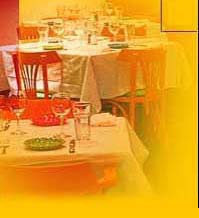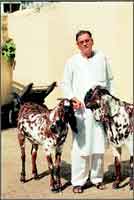


 The Biryani King Of Bombay!
The Biryani King Of Bombay!Delhi Darbar�s JAFFERBHAI MANSURI makes the best Biryani in Bombay. He is one restaurateur who can cook every item of food on the menus of his popular Mughlai eateries. �You must know and love food to be able to serve food,� he tells MARK MANUEL, recounting his story of success. |
|
JAFFERBHAI Mansuri is known in gourmet circles as the Biryani King of Bombay. No restaurateur serves better biryani than him. But don�t take my word for it. Go to his Delhi Darbar Restaurant and see for yourself. Jafferbhai has four in Bombay. The original Delhi Darbar is at Grant Road corner on the fringes of the city�s notorious red light area and in between some of the sleaziest cinema houses you will ever come across. All of Bombay�s taxi-drivers, and victoria-wallahs, know the restaurant. They are forever taking the Arab guests of Taj and Oberoi there for dinner. The other Delhi Darbars are at Coloba, Dongri, and in suburban Versova.
You may eat at any one of them, the biryani will taste the same, on that you may take my word. That�s because Jafferbhai has trained all the cooks himself. They are not professionals who have passed out of catering colleges but men whose families have been in his employ for years. He takes them into his service, trains them in the art of Mughlai cooking, then gives them his secret �formula� to make biryani. However, the formula works only in a Delhi Darbar Restaurant. Cooks who have left and tried to repeat his success outside have failed miserably, Jafferbhai told me somewhat gleefully.
When you eat with him, the biryani is served separately, meaning, the yellow Basmati rice, brand 505 from Dehradun, is given to you minus the meat and birasta of burnt, brown onion strands. (And the best biryani is always meat, remember that!) You take the meat, which comes in another plate, thick with masala, and mix it in your rice. Then you sprinkle the birasta over it. That is the way Jafferbhai likes to eat his biryani. In another quarter-plate, you will be served the pyaaz: freshly cut onion rings and quarters of green lime. Queeze a little lime onto the onions, the rest onto your biryani, it adds a zing to the dish. And eat with your fingers, feel the texture of the meat, it is the softest, most succulent you will get in Bombay. Jafferbhai shops for it himself, selecting only the best cuts of kid goat to go into his biryani.
Delhi Darbar till then was still not a restaurant. It continued to sell chai, coffee, mithai and lassi. And it did not wholly belong to Jafferbhai�s family too. They acquired it in 1964. Jafferbhai, with great enterprise, started the food service in 1973. By then he had mastered Mughlai cooking completely. Not just biryanis and kormas, as his mother had suggested. His instructor was an old family retainer from Ratnagiri, a trusted cook of his father�s, who had been running the family�s catering business for over 50 years. This man, Yakub Khan, trained Jafferbhai to cook all kinds of North Indian food, but especially the Mughlai cuisines of Delhi and Lucknow. And he encouraged Jafferbhai to specialise in making an authentic biryani from scratch. Today, Jafferbhai�s children swear by his biryani.
Somewhat embarrassed by all the fuss his family is making of his cooking, Jafferbhai explains his expertise in the kitchen: �My mother always told me that if I know how to cook, my gaadi will run, nobody will be able to get ahead of me.� This is how he talks, in a simple, everyday manner. And he is a simple man, dressed in white kurta-pyjama, polished glasses, a mobile phone in hand that keeps constantly beeping. He loves to talk about food and cooking. And he loves to have his family about him. The wife and daughters and servants are on pins when they cook at home and Jafferbhai is dining with them. He�s critical. And he�s particular. If the food is not upto his mark, he will reject it. And then he will roll up his immaculate kurta sleeves and go into the kitchen to show them how it�s done!
Jafferbhai explains the USP of Delhi Darbar, his success story so to say. �If the quality, quantity and price are correct, the service is perfect, and all these four things are in your control, then your customers will go home satisfied with their dining experience.� What set Delhi Darbar�s food apart from the other Mughlai speciality restaurants in Bombay, I asked, hoping to discover the man�s trade secret. �There�s not much difference in rate between us and the common restaurants,� he revealed, �but our quality is a byword in the restaurant business.� And for this, again, I can vouch. Jafferbhai is a bit of a wizard at the purchasing of ingredients as well. He can identify good and bad produce. He can look at a goat and tell how much meat it will yield when it is cut and cooked. And he orders only the best chicken, mutton, rice and oil for his business. He has fixed suppliers, all of them have become multi-millionaires just by supplying to Jafferbhai, and he is happy with them.
�My passion is to expand further, but these children of mine don�t encourage me,� Jafferbhai complained to me. �Mazhar has graduated from the Dadar catering college, he�s done a stint at the Taj, and I have trained him in cooking myself. But he has a good eye for purchases. Mohsin, my second son, is studying catering in Switzerland. And Moin, the youngest boy, is helping me with the restaurants. The girls, Rizwana, who is married, and Lubna and Needa, are more painstaking and understanding. But I tell them, get an education, that is your asset, not the business. If you are a B.Ed or M.Ed you are worth at least Rs. 15,000 a month. But my children are cautious. I want to experiment with new concepts, give man cheap and fast food, try and catch a different clientele. I tell my kids, �If the business suffers a loss, so what, I can take it. Don�t worry. Take the risk.� But they won�t!�
No story on Jafferbhai would be complete without mention of his catering unit, The Biryani Factory, at Clare Road in Byculla, Bombay. It is a big shed, really, in which there are open choolahs fired by wood on which the cooking is done by a family of old cooks. The Biryani Factory has a butchery and a vegetable section. And crockery and cutlery to feed 10,000. Plus Jafferbhai is creating a laundry to wash napkins and uniforms of his staff. �At any time with just three hours� notice, I can cater for however many people you want,� he says proudly. When there are big catering orders, Jafferbhai will keep track of how the service is going through his manager on a mobile.
�I like to serve good food, see people happy, their satisfaction is my happiness, their goodwill keeps my Delhi Darbar banner up,� he said.
Jafferbhai Mansuri is a religious, Allah-fearing man. He is a strict and practising Muslim, he says his namaz the required number of times a day, he provides place for his Muslim staff members to pray, he has done the Haj pilgrimage 20 times already, and he has been to Umrah 25 times, he keeps all the rozas during Ramzan even though he is diabetic. I listen to him make a call to the manager of his Colaba restaurant. �Some friends of mine are coming for dinner. There are women too. Seat them in the air-conditioned section. Take care of them. And make sure you serve them biryani, tell them Jafferbhai said they must eat it!�
|
|
|

Home Page
About the mag
Subscribe
Advertise
Contact Us
 I tried asking him what the biryani formula was over lunch at the Delhi Darbar in Grant Road. But Jafferbhai, who must have been asked this question many times before, ignored me. �Enjoy the biryani, instead,� he ordered, and heaped another big spoonful onto my plate. He is that kind of man. He talks little. And he has made it his life�s mission to entertain and feed the citizens of Bombay, all his friends, with good food. �Only when you can be generous and large-hearted enough towards others with food will you really enjoy eating yourself,� he said to me now, signalling to a waiter to fetch us more biryani. After this, we were to drive over to his residence nearby and meet Jafferbhai�s family of 11.
I tried asking him what the biryani formula was over lunch at the Delhi Darbar in Grant Road. But Jafferbhai, who must have been asked this question many times before, ignored me. �Enjoy the biryani, instead,� he ordered, and heaped another big spoonful onto my plate. He is that kind of man. He talks little. And he has made it his life�s mission to entertain and feed the citizens of Bombay, all his friends, with good food. �Only when you can be generous and large-hearted enough towards others with food will you really enjoy eating yourself,� he said to me now, signalling to a waiter to fetch us more biryani. After this, we were to drive over to his residence nearby and meet Jafferbhai�s family of 11. Delhi Darbar is over 50 years old. It was originally a chai-coffee-lassi-mithai shop at Grant Road owned by a businessman named Latifulla. In 1949, Jafferbhai�s father Gulam Mohammed, a Mughlai food caterer, went into partnership with Latifulla on a 25 per cent stake in the restaurant. But Latifulla went to settle down in Pakistan and Gulam Mohammed passed away in 1952, leaving his three sons, Jaffer, Shafi and Iqbal, to look after Delhi Darbar. Jafferbhai, the eldest, was 16, and studying in K. C. College. His mother never let him complete his education. �Start learning how to make biryanis and kormas, instead, that�s your business,� she advised him. And that was his beginning as a restaurateur.
Delhi Darbar is over 50 years old. It was originally a chai-coffee-lassi-mithai shop at Grant Road owned by a businessman named Latifulla. In 1949, Jafferbhai�s father Gulam Mohammed, a Mughlai food caterer, went into partnership with Latifulla on a 25 per cent stake in the restaurant. But Latifulla went to settle down in Pakistan and Gulam Mohammed passed away in 1952, leaving his three sons, Jaffer, Shafi and Iqbal, to look after Delhi Darbar. Jafferbhai, the eldest, was 16, and studying in K. C. College. His mother never let him complete his education. �Start learning how to make biryanis and kormas, instead, that�s your business,� she advised him. And that was his beginning as a restaurateur. �His cooking style is so distinctive,� says his eldest son Mazhar, �that we can taste a biryani and tell if Daddy has made it.� But biryani is not all that they like �Daddy� to cook. Jafferbhai can cook the entire Delhi Darbar menu, right upto the last item in desserts, which is caramel custard. And there are times in his catering business when he personally turns out in the kitchen to help in the cooking if there is a big order. At his posh home in Bombay�s Agripada area, Jafferbhai often cooks for wife Taslima and his seven children and three grandchildren. But this food is unlike his Delhi Darbar ka khaas khana. He goes easy on the oil and spices because this is for the �gharwale�. �He makes the best dal-gosht and korma in town,� reveals Jafferbhai�s eldest daughter Rizwana.
�His cooking style is so distinctive,� says his eldest son Mazhar, �that we can taste a biryani and tell if Daddy has made it.� But biryani is not all that they like �Daddy� to cook. Jafferbhai can cook the entire Delhi Darbar menu, right upto the last item in desserts, which is caramel custard. And there are times in his catering business when he personally turns out in the kitchen to help in the cooking if there is a big order. At his posh home in Bombay�s Agripada area, Jafferbhai often cooks for wife Taslima and his seven children and three grandchildren. But this food is unlike his Delhi Darbar ka khaas khana. He goes easy on the oil and spices because this is for the �gharwale�. �He makes the best dal-gosht and korma in town,� reveals Jafferbhai�s eldest daughter Rizwana. I ask daughter Rizwana what happens when the family goes out for dinner. Does Jafferbhai like any cuisine other than Delhi Darbar�s food? Does he enjoy Chinese? Or Thai, perhaps? �He loves biryani,� she says with finalty and a giggle. �But when we travel abroad, he will eat out in Indian restaurants, and he is generally recognised by the owners or the chefs there. If he knows them well, or if they are close to him, Daddy will tell them if the food is good or bad.� In Bombay, naturally, Jafferbhai�s favourite eating out places are his Delhi Darbar Restaurants. He spends at least an hour with each of them daily. And he tastes the food at each restaurant that is prepared and ready. That way the kitchen staff are always on their toes. They never know when the boss will make a check.
I ask daughter Rizwana what happens when the family goes out for dinner. Does Jafferbhai like any cuisine other than Delhi Darbar�s food? Does he enjoy Chinese? Or Thai, perhaps? �He loves biryani,� she says with finalty and a giggle. �But when we travel abroad, he will eat out in Indian restaurants, and he is generally recognised by the owners or the chefs there. If he knows them well, or if they are close to him, Daddy will tell them if the food is good or bad.� In Bombay, naturally, Jafferbhai�s favourite eating out places are his Delhi Darbar Restaurants. He spends at least an hour with each of them daily. And he tastes the food at each restaurant that is prepared and ready. That way the kitchen staff are always on their toes. They never know when the boss will make a check. He opened his second Delhi Darbar Restaurant in 1976. This one was at Colaba and meant more for the international clientele that, perhaps, might not find its way to the Grant Road restaurant. In 1988, he opened the third Delhi Darbar in Dongri to help out a friend who had property there and was running into huge financial losses. The Versova Delhi Darbar came up in 1997. This location was Jafferbhai�s choice. He had no suburban branch. And he believed Delhi Darbar had a big market in the upper middle-class suburbanite. It helped that a friend�s shop in Versova burnt down and he sold the place to Jafferbhai. This restaurant has a slightly larger menu than the other Delhi Darbars. Jafferbhai has cleverly included such items as baida roti and bhuna gosht here because he knows the eating habits of people living in suburban Bombay are different from those in the city. And he�s right!
He opened his second Delhi Darbar Restaurant in 1976. This one was at Colaba and meant more for the international clientele that, perhaps, might not find its way to the Grant Road restaurant. In 1988, he opened the third Delhi Darbar in Dongri to help out a friend who had property there and was running into huge financial losses. The Versova Delhi Darbar came up in 1997. This location was Jafferbhai�s choice. He had no suburban branch. And he believed Delhi Darbar had a big market in the upper middle-class suburbanite. It helped that a friend�s shop in Versova burnt down and he sold the place to Jafferbhai. This restaurant has a slightly larger menu than the other Delhi Darbars. Jafferbhai has cleverly included such items as baida roti and bhuna gosht here because he knows the eating habits of people living in suburban Bombay are different from those in the city. And he�s right! Jafferbhai himself has finished taking all the risks. Apart from his Delhi Darbar restaurants, which he owns in partnership with a surviving brother, he has the catering business, a residential hotel called Mogul Palace in Masjid Bunder area of Bombay, and a posh Delhi Darbar Restaurant in Dubai. The kitchen staff for all his units, he trains himself. �Nobody�s from outside, nobody�s a professional, I teach them my formula, I explain my needs, that�s how it goes,� he said. This formula, I asked curiously, is it a generic recipe or what? Jafferbhai smiled smugly. The formula, he said, was in his mind. It had been there since his grandfather�s time! And he knew it by heart, the exact and authentic Mughlai recipes for every dish on his Delhi Darbar menus, right down to the quantities of the ingredients.
Jafferbhai himself has finished taking all the risks. Apart from his Delhi Darbar restaurants, which he owns in partnership with a surviving brother, he has the catering business, a residential hotel called Mogul Palace in Masjid Bunder area of Bombay, and a posh Delhi Darbar Restaurant in Dubai. The kitchen staff for all his units, he trains himself. �Nobody�s from outside, nobody�s a professional, I teach them my formula, I explain my needs, that�s how it goes,� he said. This formula, I asked curiously, is it a generic recipe or what? Jafferbhai smiled smugly. The formula, he said, was in his mind. It had been there since his grandfather�s time! And he knew it by heart, the exact and authentic Mughlai recipes for every dish on his Delhi Darbar menus, right down to the quantities of the ingredients.